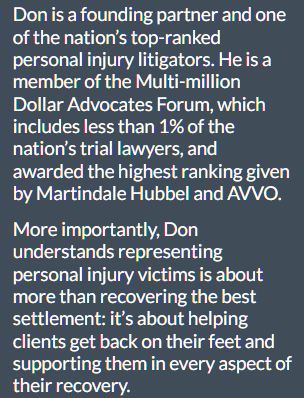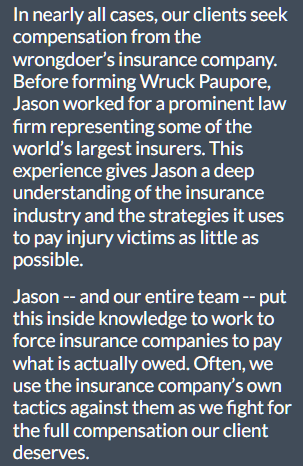




Nursing home abuse is more common than we would all hope. The lack of oversight and the fact that many residents live alone exposes many to abuse.
Physical and emotional abuse are the most common types of mistreatment, but neglect, financial abuse, and sexual abuse abound. Most forms of abuse can be difficult to spot, especially if a resident is being isolated from loved ones. Identifying abuse is made even more challenging by the fact that nursing homes and staff are often the ones perpetrating the abuse. Several studies showed that nursing home staff regularly engaged in abuse. However, other residents also caused a great deal of mistreatment. No person should suffer these types of abuse, especially nursing home residents.
For a free, private review of your case with our nursing home abuse lawyers, call Wruck Paupore today at (219) 322-1166.
Unfortunately, abuse of the most vulnerable in our communities, seniors, is a significant problem across the country. Nowhere is elderly abuse more prevalent than in nursing homes. The World Health Organization reports that two-thirds of staff interviewed for a study admitted to abusing a nursing home resident in the past year.
However, nursing home mistreatment can take many forms, ranging from neglect to physical abuse. Other types of abuse are more insidious and harder to identify, like psychological and emotional abuse. Our nursing home abuse lawyers have decades of experience investigating these cases. They can help determine if you or a loved one has suffered mistreatment at the hands of staff or another resident. The following discusses the most common types of nursing home abuse reported and how to recognize them:
Physical abuse of nursing home residents is a major problem and accounts for a major portion of the types of abuse suffered. A study showed that 17% of the observed nursing home staff reported shoving, pushing, or grabbing residents. However, other residents also commonly commit physical abuse.
Signs of physical abuse are not as obvious as one might think. Injuries like bruises, scrapes, and cuts could be hidden by clothes or heal before anyone notices them. If you suspect physical abuse of a loved one, pay particular attention to their wrist and ankles. Bruises and markings often show if staff are restraining or tying them down.
Emotional and psychological abuse are some of the hardest forms of abuse to detect because it is often subtle. Still, they can have devastating and long-lasting effects on a resident. These types of abuse include belittling residents, making verbal threats, humiliating residents, isolating them, or manipulating them. Of those studied, a majority of nursing home staff admitted to swearing and yelling at residents.
While psychological and emotional abuse does not leave physical evidence, you can take note of certain signs if you have suspicions. Perhaps your loved one has a great sense of humor or overall spirit, but you have noticed a steady decline in their mood over the last few visits. They might be depressed despite not having a history of depression. Some victims might not want to talk about their experiences out of shame, but our team can counsel you on what steps to take next to protect your loved one.
Neglect of nursing home residents is also a major type of mistreatment, accounting for 14% of cases studied. Residents can be neglected in numerous ways, but it ultimately can lead to serious emotional and physical harm, even death. Not providing basic necessities like shelter, food, and medical care are common in many nursing homes. Some nursing homes do not administer medications regularly, even keeping some residents’ medication for their own use. Instead of doing activities and living a comfortable retirement, residents might be stuck in a room with other residents and left there for the day.
Like other forms of abuse, neglect can be hard to detect. Neglect is often unreported because victims feel a deep sense of shame or fear of nursing home staff. Nursing homes should have clear policies for caring for loved ones and facilitating their needs. If they do not, it could be a sign that the nursing home is running a sloppy, careless operation. The best way to combat neglect is to check in with your loved one regularly and pay attention to whether their needs are being met.
While not as common as the forms of abuse discussed already, financial abuse is steadily growing as more residents get access to the Internet. Many nursing home residents live alone and might not have family and friends checking in on them regularly, making them prime targets for online and telephone scams. Again, check the nursing home’s policies for how it monitors suspicious financial activity.
Of course, nursing home staff can also commit financial abuse, as they have more access and potentially the trust of residents. Some staff will have access to residents’ sensitive financial information. If a staff member wanted to exploit this, they could manipulate financial documents, forge a resident’s signature, and find other methods to take money from residents. Some victims might not even know they have been financially abused until you connect with them and discuss their finances.
The most heinous type of mistreatment nursing home residents suffer is sexual abuse. However, sexual abuse is not limited to nonconsensual intercourse. It includes any unwanted sexual contact or touching, like fondling, inappropriate sexual comments, and rape. If a nursing home resident is the victim of sexual abuse, they will likely exhibit serious emotional distress and possibly physical injuries. If you suspect this kind of abuse, get in touch with our team to help put a stop to it and get justice.
To have your case reviewed free of charge with our nursing home abuse attorneys, contact Wruck Paupore at (219) 322-1166.
Don is a founding partner and one of the nation’s top-ranked personal injury litigators. He is a member of the Multi-million Dollar Advocates Forum, which includes less than 1% of the nation’s trial lawyers, and awarded the highest ranking given by Martindale Hubbel and AVVO.
More importantly, Don understands representing personal injury victims is about more than recovering the best settlement: it’s about helping clients get back on their feet and supporting them in every aspect of their recovery.

In nearly all cases, our clients seek compensation from the wrongdoer’s insurance company. Before forming Wruck Paupore, Jason worked for a prominent law firm representing some of the world’s largest insurers. This experience gives Jason a deep understanding of the insurance industry and the strategies it uses to pay injury victims as little as possible.
Jason -- and our entire team -- put this inside knowledge to work to force insurance companies to pay what is actually owed. Often, we use the insurance company’s own tactics against them as we fight for the full compensation our client deserves.

For more than four decades, Keith has been fighting for injury victims. During that time, he’s watched the insurance industry change, with insurers now more interested in protecting their stock price than treating injury victims fairly.
Since the beginning, Keith has put people first. From his childhood in Gary, Indiana during the 1960’s and working his way through law school, Keith has risen to become one of the Midwest’s most respected trial lawyers. He has never forgotten that being a lawyer is about helping people -- and seeing injury victims through struggles in a way that could change their lives forever.
Over the decades, Keith, Don and Jason have fought relentlessly for clients, even when other lawyers have said the case was impossible to win.


© 2025
Terms of Service | Privacy Policy | Resources | Blog | Sitemap

© 2022 Wruck Paupore PC
Terms of Service | Privacy Policy